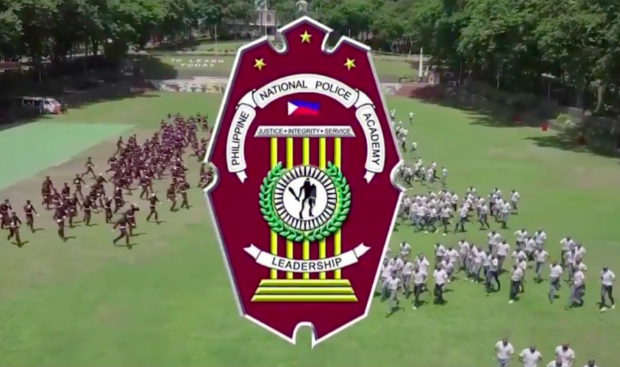Senators told: PNPA cadets only get allowance, no other benefits

Screengrab from the PNPA website
MANILA, Philippines — An official of the Philippine National Police (PNP) on Wednesday bared that cadets of the country’s police academy only receive an allowance and no other benefits.
Lt. Gen. Rhoderick Armamento explained before the joint hearing of the Senate committees on public order and dangerous drugs, local government, and finance the importance of recognizing the status of Philippine National Police Academy (PNPA) cadets so they can be eligible for more perks such as medical benefits.
The Senate panels were conducting an inquiry on the proposed amendments to the Department of the Interior and Local Government (DILG) Act of 1990.
“I remember then, we are really pushing that instead of a job order, the status of our cadets be recognized even if it’s just a temporary status, simply because of the benefits. Even up to this moment, our cadets are not receiving medical benefits or any entitlements. When something happens to them, we contribute money to help the parents of the cadets,” Armamento, a former PNPA director, told senators.
Senator JV Ejercito, who had filed his own proposed changes to the DILG Act of 1990, said this should be taken into consideration when drafting amendments to the law.
Article continues after this advertisement“It’s sad to hear that they’re passing the buck just to help [cadets] should an accident or whatever incident happen to them,” he said.
Article continues after this advertisementNational Police Commission Vice Chairperson and Executive Officer Alberto Bernardo also weighed in on the issue. He cited a provision in the DILG Act of 1990 that requires an individual to possess a baccalaureate degree before they can be considered members and officers of the PNP.
This, according to Bernardo, is why PNPA cadets are limited to job orders and are not granted benefits.
“That’s why this legislation is needed. This opportunity [and] your proposal is what will solve this problem,” he pointe out.
Armamento also raised the issue of under-recruitment in the PNPA. The academy aims to recruit 400 cadets annuall, but it only manages to enlist 250 to 300 each year.
Bernardo, however, argued that this is being compensated by the recruitment in the National Police Training Institute.
Delayed salaries of PNPA professors?
Ejercito likewise asked about reports he received about a supposed exodus of PNPA professors due to alleged delay in the release of their salaries.
Senator Ronald dela Rosa, who presided over the hearing, responded to point out that this was a prevailing problem back when the PNPA was not yet under the national police. Dela Rosa was PNP chief prior to being elected senator.
Armamento said processing the pay of PNPA professors no longer takes time since the PNP took the academy under its wing.
Newly designated PNP Deputy Chief for Operations Maj. Gen. Jonnel Estomo then broached the idea of giving the PNPA chapters fiscal autonomy so they will have the power to allocate their funds according to their priorities.
Bernardo, meanwhile, pointed out the difference between professors in the PNPA and the Philippine Military Academy. He said that professors in the country’s military academy have a tenure.
He likewise said that delayed salaries mostly affected members of the PNPA Corp of Professors.
“The professors were not cared for, that’s why they left. They expressed hopes that the professors will not only come from the PNP. Because there’s a commandant in charge of tactical operations, but there’s also a dean for academic affairs. There should be a balance,” Bernardo further explained.
Taking into consideration the points raised by Bernardo, dela Rosa called on the PNP to fix the issue concerning the PNPA Corps of Professors.
Armamento, meanwhile, cited a bill filed in the House of Representatives which seeks to strengthen the PNPA as a self-governing public higher educational institution.
House Bill No. 3507, filed by 4Ps Rep. and House Minority Leader Marcelino Libanan, aims to revisit the PNPA Charter of 1981 “to be responsive to the current challenges and demands of public safety and social defense.”
If passed into law, the measure will give the PNPA the “right to determine its policies, plans, and programs, academic and otherwise, unhampered by external control, pressure of influence, as part of its constitutional guaranteed right to academic freedom.”
Armamento pointed out that the bill includes a provision that gives emphasis to the Corps of Professors, including their salaries.
RELATED STORIES
At least 1,000 aspirants to take PNPA Cadetship Admission Test
PNPA cadet succumbs after reception rites